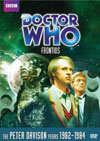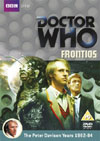DVD Extras include:
One excellent thing that is very noticeable in comparison to the previous stories is that we get scenes that explore and celebrate character, and do it better than anywhere else in the season. The three series leads finally have a chance to enjoy who they are, and there is significant variety in the guests as well. In fact, this is about the only story where Turlough is really used well outside of his introductory trilogy and his farewell story, and he gets to play a lot of good, moving scenes with Lesley Dunlop's Norna.
The Best of Peter Davison's DoctorPeter Davison also seems to hit the peak of his original run as the Doctor in this tale. He's eccentric, sweeps in as the hero who humbly doesn't want to take any public credit for what he does, doesn't shy away from debates with misguided leaders, stays honest, spends plenty of time as an active investigator, remains in good humour throughout the adventure, makes his way through all of the story's sets saving the enemy's lair for last, finally gets some good humorous character payoff in his prickly long-term relationship with Tegan, and gets to have as much fun in the final confrontation as Patrick Troughton's Doctor did back in "The Krotons" (story no. 47). And, it's also primarily Peter Davison's acting that really sells the opposing force's unique abilities in many of the most important action sequences of the middle of the story. Superb.Tegan also gets to be a complementary companion for once, while still being herself, and she displays refreshing honesty as well in some confrontations that would probably have used fibs instead had original script editor David Whitaker been writing the story. The guest characters are really well defined also. William Lucas is particularly charming as Science Officer Range, and between him and Norna, they make it very easy for the audience to root for the Doctor and his companions to help the Frontios colony with its many difficulties. Although Brazen is often played somewhat as a character of parody, the writing strongly balances his character and keeps him believable.
Most of the characters get introduced in scenes of good length, including the regulars, and the TARDIS is demonstrated well early on from a writing point of view. Sadly, a few extra easy points were probably lost when a few scenes were deleted for time. The actual shots of the police box could have been more inspiring, but they're not bad. Thankfully, the regulars meet the guests properly very early on in the story, making it easy to follow. All this helps when the inevitable 80's style intercutting becomes extremely frequent later on. Still, each episode holds up fairly well if viewed cold. This becomes the final story that Paddy Kingsland composed music for, and in many ways, it's my favourite of his Doctor Who scores. There are a lot of good thematic strains running through this one, and a variety of styles that mixes wistful melancholy with darker tension and upbeat action cues. Once again, Kingsland's most prominent lead instrument is a synthetic flute sound, but he seems to have gone for something of a panflute variety, making an interesting change from most of his other Doctor Who (and Hitchhiker's Guide to the Galaxy) music. Once again, one wonders if the melodic themes don't get repeated a bit too often before the end, but they are enjoyable and it makes good listening. Ron Jones does fairly well directing this story, getting good atmosphere, tension, and pace into the story, while also allowing the characters space to breathe and remain upbeat where it will benefit the story best. Inevitably, there are a few things for which they probably would have liked to do extra takes, but these are mostly forgivable. I think we also have to note how much better the between-story continuity links are when they appear at the end of the story, as in the final cliffhanger here leading into "Resurrection of the Daleks" (the next story). This is so much better than what we got in "Mawdryn Undead" (story no. 126), which began with the ending of the previous story being unnecessarily discussed (and potentially spoiled for those who hadn't yet seen it). Still, sometimes it's best to leave out such things altogether.
This story is available on DVD and VHS video:
Comments on this article are welcome. You may contact the author from this page:
|








